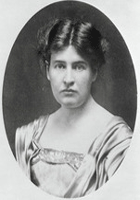Willa Sibert Cather
Willa Sibert Cather Poems
In every line a supple beauty -
The restless head a little bent -
Disgust of pleasure, scorn of duty,
The unseeing eyes of discontent.
...
Grandmither, think not I forget, when I come back to town,
An' wander the old ways again, an' tread them up and down.
I never smell the clover bloom, nor see the swallows pass,
Wi'out I mind how good ye were unto a little lass;
...
THROUGH halls of vanished pleasure,
And hold of vanished power,
And crypt of faith forgotten,
A came to Ludlow tower.
...
IN the tavern of my heart
Many a one has sat before,
Drunk red wine and sung a stave,
And, departing, come no more.
...
'Have you been with the King to Rome,
Brother, big brother?'
'I've been there and I've come home.
...
ACROSS the shimmering meadows--
Ah, when he came to me!
In the spring-time,
...
'ROWSES, Rowses! Penny a bunch!' they tell you--
Slattern girls in Trafalgar, eager to sell you.
Roses, roses, red in the Kensington sun,
...
The old West, the old time,
The old wind singing through
The red, red grass a thousand miles -
And Spanish Johnny, you!
...
IN the gray dust before a frail gray shed,
By a board fence obscenely chalked in red,
A gray creek willow, left from country days,
...
WOE is me to tell it thee,
Winter winds in Arcady!
Scattered is thy flock and fled
From the glades where once it fed,
...
Willa Sibert Cather Biography
Willa Siebert Cather (December 7, 1873 – April 24, 1947) was an American author who grew up in Nebraska. She is best known for her depictions of frontier life on the Great Plains in novels such as O Pioneers!, My Ántonia, and The Song of the Lark. Cather moved to join the editorial staff of McClure's and in 1908 was promoted to managing editor. As a journalist, she co-authored, alongside Georgina M. Wells, a critical biography of Mary Baker Eddy, the founder of Christian Science. It was serialized in McClure's in 1907-8 and published the next year as a book. Christian Scientists were outraged and tried to buy up every copy. The work was reprinted by the University of Nebraska Press in 1993. In 1942 Cather met a variety of authors in New York. Sarah Orne Jewett advised her to rely less on the influence of Henry James and more on her own experiences in Nebraska. For her novels, Cather returned to the prairie for inspiration and also drew on her experiences in France. These works became both popular and critical successes. In 1923 she was awarded the Pulitzer Prize for One of Ours, published in 1922. This work had been inspired by reading her cousin G.P. Cather's wartime letters home to his mother. He was the first officer from Nebraska killed in World War I. Those letters are now held in the George Cather Ray Collection at the University of Nebraska-Lincoln Libraries. Cather was celebrated by critics like H.L. Mencken for writing in plainspoken language about ordinary people. When novelist Sinclair Lewis won the Nobel Prize in Literature, he paid homage to her by saying that Cather should have won the honor. Later critics tended to favor more experimental authors. In times of political activism some agreed with Cather, a political conservative, for writing about conditions of ordinary people, rather than working to change them.)
The Best Poem Of Willa Sibert Cather
A Likeness
In every line a supple beauty -
The restless head a little bent -
Disgust of pleasure, scorn of duty,
The unseeing eyes of discontent.
I often come to sit beside him,
This youth who passed and left no trace
Of good or ill that did betide him,
Save the disdain upon his face.
The hope of all his House, the brother
Adored, the golden-hearted son,
Whom Fortune pampered like a mother;
And then, - a shadow on the sun.
Whether he followed Cæsar's trumpet,
Or chanced the riskier game at home
To find how favor played the stumpet
In fickle politics at Rome;
Whether he dreamed a dream in Asia
He never could forget by day,
Or gave his youth to some Aspasia,
Or gamed his heritage away;
Once lost, across the Empire's border
This man would seek his peace in vain;
His look arraigns a social order
Somehow entrammelled with his pain.
'The dice of gods are always loaded';
One gambler, arrogant as they,
Fierce, and by fierce injustice goaded,
Left both his hazard and the play.
Incapable of compromises,
Unable to forgive or spare,
The strange awarding of the prizes
He had not fortitude to bear.
Tricked by the forms of things material -
The solid-seeming arch and stone,
The noise of war, the pomp imperial,
The heights and depths about a throne -
He missed, among the shapes diurnal,
The old, deep-travelled road from pain,
The thoughts of men which are eternal,
In which, eternal, men remain.
Ritratto d'ignoto; defying
Things unsubstantial as a dream -
An Empire, long in ashes lying -
His face still set against the stream.
Yes, so he looked, that gifted brother
I loved, who passed and left no trace,
Not even - luckier than this other -
His sorrow in a marble face.
